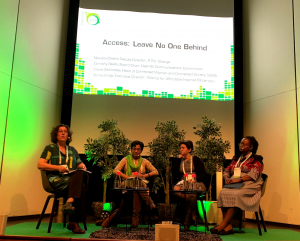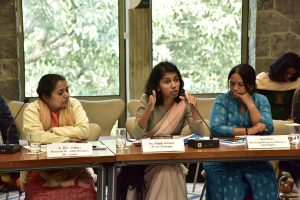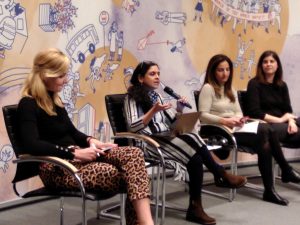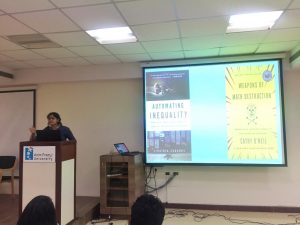Gender Justice in the Digital Society
The feminist project of expanding women’s autonomy and overturning entrenched power hierarchies demands new strategies in these datafied times. Digital technologies have completely restructured society and its institutions. As data becomes the key artifact of power and control, feminism needs to stay ahead in its theory and practice. Our research, advocacy and networking efforts at global and national levels are directed towards this imperative, in order to promote gender justice in the digital society.
Policy research
Righting gender wrongs: A socio-legal enquiry on gender-based cyber violence
In 2018-19, with support from the Web Foundation, we deepened our existing line of policy-oriented research on gender-based cyberviolence through the Righting Gender Wrongs project – a socio-legal enquiry into young women’s empirical experiences of the phenomenon across six locations in Kerala, Karnataka and Tamil Nadu. We mapped emerging typologies of violence experienced by the born-digital generation and the effectiveness of prevailing legal-institutional responses through a quantitative survey with 881 young women aged 19-23 years and qualitative explorations with their male peers and a range of other stakeholders. To deepen the analysis, we also mapped perspectives of police officials, crisis support counselors, women’s rights and LGBTQI activists, women in public life, women lawyers, public prosecutors, women in media and representatives of institutional committees on sexual harassment.
In the implementation of this study, we partnered with well-known Indian feminist academic, J. Devika, and her team for the Kerala leg of the study and veteran lawyer and gender equality advocate, Geeta Ramaseshan, and her team for the Tamil Nadu component. We also leveraged our existing linkages with the Indian Police Foundation and the Bureau of Police Research and Development for data collection on law enforcement perceptions.
The study demonstrated the pervasiveness of cyberviolence, both identity-based harassment and new forms of sexual harassment such as cyberstalking, doxxing and cyberflashing. It also provided unequivocal evidence on the numerous harms triggered by such acts; from chilling effects on women’s free speech, to psychological, social, functional, and aspirational impacts. Most damningly, it revealed the return of gender conservatism in digital sociality, in contrast to the liberating gender-fluid encounters hoped for by cyber-feminists. It also highlighted the lacunae in existing legal-institutional responses and the complications associated with the entry of a new actor in the picture – the platform intermediary. The study pointed to specific directions for legal reform, capacity-building and cultural reforms in policing and law enforcement and enforcement of platform responsibility.

We invested intensively in a strategic media and communication outreach plan for the project. During the 16 Days of Activism against gender-based violence between 25 November-10 December 2018, we ran a digital media campaign, bringing in empirical evidence from different sites of research to argue for urgent concerted action on cyberviolence. We also wrote about the issue on the occasion of International Women’s Day to keep it in the public eye, and shared insights at the Stockholm Internet Forum, May 2019.
Digital Justice Project
As a collaborative research and advocacy initiative of IT for Change and Development Alternatives with Women for a New Era (DAWN) network, the Digital Justice Project is focused on connecting feminist concerns about gender justice to emerging issues in the digital frontier, in order to evolve informed and cutting edge feminist analysis and action. The project responds to the urgent need for Southern visions of transformative change in these times of paradigmatic shift, exhorting feminists from the South to engage with the political economy of data and use their knowledge and wisdom to frame the debates.

We authored two issue papers: a feminist political economy analysis of the digital economy, and a commentary on reclaiming the transformative potential of e-commerce for women’s empowerment, by rejecting the pink-washing that happens in mainstream trade policy circles. We took our analysis to critical global policy forums. With DAWN, we co-organized sessions at the WTO Public Forum 2018 and UNCTAD e-commerce Week 2019 to build a meaningful policy conversation on making the digital economy work for women. In February 2019, we inputed a position paper into the consultation on accelerating economic empowerment of women workers organized by the UN Women Multi-Country Office for India, Bhutan, Maldives and SriLanka.
In future months, we plan to build on this initial momentum, deepening our engagement in the area of gender and digital trade by joining hands with networks such as WIDE+ and the Gender and Trade Coalition, and strategically seizing the advocacy opportunity around the 64th Session of the UN CSW in 2020 where the Beijing-plus 25 review and an evaluation of the five-year milestone of Agenda 2030 are part of the official agenda.
Global

We are one of the few organizations in the global South who are able to straddle feminist political economy with gender and media analysis in interpreting and responding to the digital paradigm. This helps us stay ahead of the curve and contribute effectively as a member of very diverse global networks. We continued our engagement with the Global Alliance on Media and Gender (GAMAG), producing two short videos on feminist-izing digital media in the global South as part of their efforts to develop a compendium of learning resources on the issue. We also inputted into the BRICS Feminist Watch’s position on the infrastructure agenda outlined by the Asian Infrastructure Investment Bank (AIIB), specifically focusing on the risks to marginalized women stemming from the expropriation of their data resources through digital infrastructure Public Private Partnerships (PPPs) without accountability safeguards.
Anita Gurumurthy was invited as an expert speaker to the Digital Development Forum convened by the Asian Development Bank in September 2018, to provide a critical input on making the digital economy work for women. She was also a panelist at Friedrich-Ebert-Stiftung’s (FES) international public event in Berlin on Feminism and Women’s Rights under Attack! International Perspectives and Counter-Strategies in March 2019. Subsequently, FES has roped in IT for Change into its global and regional networks in Asia on Women and the Future of Work.
National
In recognition of our expertise at the intersections of gender and digital technologies, we were invited by the Government of Karnataka to contribute to the development of the state action plan for sustainable development goals, and were included as a member in the expert committees constituted on Goal 5 and Goal 9. We were also approached by the Ford Foundation to provide expert inputs into the evolution of their India level programming strategy on gender.

We partnered with Azim Premji University and FES for the second year running, to convene Genderlogues – a two-day workshop to introduce graduate students to debates at the intersections of digital technologies, women’s rights and gender justice. The theme for this year’s Genderlogues was Re-conceptualizing Women’s Rights and Gender Equality in a Platformizing Society.
Impact
Our work on gender-based cyberviolence has been ahead of the curve and is serving as a critical contribution at a conjuncture when the policy debate on the issue is acquiring traction at the national level. We have not only managed to produce knowledge but also been successful in catalyzing a vibrant multi-stakeholder dialogue on the issue through alliance-building and continuous networking. Through the Digital Justice Project, we are able to bring Southern frames into the critical spaces where the future of the digital economy is being shaped. We are able to bring interdisciplinary expertise on gender and media, women’s digital rights, and a feminist political economy analysis of the data paradigm, which contributes to a huge impact footprint in global networks.
Plans for 2019-20
We are in the process of initiating a two-country research study in India and Brazil on addressing gender-based hate speech online. In collaboration with UN Women and the Indian Police Foundation, we are planning to convene a multi-stakeholder dialogue on gender-based cyberviolence, in August 2019. We will expand our work under the Digital Justice Project with big bang advocacy events at CSW 64 under the umbrella of Women March towards 2030 in the Fierce and Tricky Digital World. At the national level, we will explore collaborations with local organizations working with women to demonstrate viable pathways for platform based business models organized on principles of a feminist solidarity economy.
